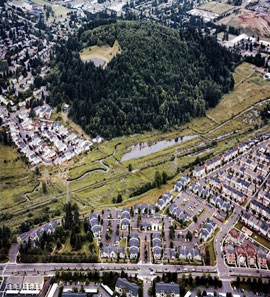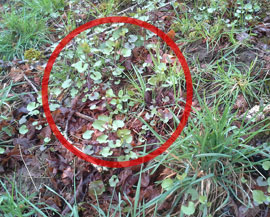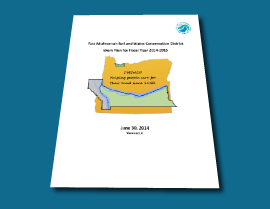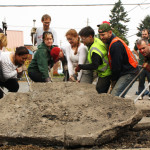We have roughly 30 CY of mixed horse manure, pine shavings, limited hay, alpaca and chicken manure. We can load with tractor or excavator or you can hand load. $20 per load to cover fuel on machine, free if loaded yourself. Continue reading
Author Archives: Alex
Our 2014-15 Work Plan
Our work plan for the 2014-15 fiscal year is now available! You can download it here.
The East Multnomah Soil and Water Conservation District provides technical, educational and financial assistance to landowners, managers and others in an effort establish and maintain healthy ecosystems, with a particular focus on soil, water, and habitat conservation. We create a work plan every year in order to organize and prioritize our work, and set specific program goals to further our mission. Learn more about our mission and the work we do in the District in the About EMSWCD section.
Raleigh Hills garden in need of Horse/bedding manure
My garden lacks topsoil. I could really use manure loads of horse manure with straw bedding. (Sorry, can’t use wood chips, got enough of those.) There’s lots of room. Easy access to where it needs to go. I don’t have a truck, and even if I did, I’ve got a bad shoulder. Would need it delivered. We’re in the Raleigh Hills/Sylvan area of SW Portland, about five miles from down town Beaverton. If you’re in the area, please email. Thanks! Continue reading
Announcing our 2014 Partners in Conservation Grants!
East Multnomah Soil and Water Conservation District announces its 2014 Partners in Conservation (PIC) grants totaling $862,000 awarded to conservation and environmental education projects in the District’s boundaries (all of Multnomah County east of the Willamette River).
- Volunteers working together to remove pavement!
- Children at an outdoor garden class as part of the Cully Young Farmers Project
The District received 39 PIC applications this year, representing projects in each of its grant program areas: restoration, sustainable agriculture, project design/engineering, pollution prevention, stormwater management, monitoring, and environmental education. The PIC grant program funds projects on an annual basis through a competitive process that seeks to support those efforts most closely aligned with the District’s strategic priorities.
This year, the EMSWCD Board of Directors awarded 27 grants, including three multi-year PIC Plus grants, which are multi-stakeholder initiatives that demonstrate benefits from committed multi-year support. Projects vary considerably in scope, from restoring large acreages of habitat in the Johnson Creek watershed to community gardening with immigrant populations in East Portland. “The quality and diversity of projects this year is incredible. These grants allow us to reach all corners of the District, supporting the great work of these organizations while also leveraging other funding,” said Jay Udelhoven, Executive Director of EMSWCD. Continue reading
Notice of Election for District Directors of the East Multnomah Soil and Water Conservation District
Notice is hereby given that on November 4, 2014, an election will be held for the purpose of electing board director(s) to the following positions for the East Multnomah Soil and Water Conservation District:
Positions: Director of Zone 3 – 4 years; Director At-large 2 – 4 years
Zone boundaries, eligibility requirements, and copies of the required elections forms may be obtained at the SWCD Office located at 5211 North Williams Avenue, Portland, Oregon 97217 (view map), 503-222-7645. The zone boundaries and eligibility requirements are also available on our website in the links below.
Election forms and information may also be found at: http://oregon.gov/ODA/SWCD/services.shtml
Each candidate must file a “Declaration of Candidacy” and a “Petition for Nomination Signature Sheet” with the Oregon Department of Agriculture, Natural Resources Division. The filing deadline is 5:00 p.m. on August 26, 2014.

Fairview Creek Headwaters Permanently Protected
MAY 29, 2014
East Multnomah Soil and Water Conservation District (EMSWCD), Metro and the City of Gresham have purchased and permanently protected the Headwaters of Fairview Creek and Grant Butte Wetlands for wildlife habitat and public open space. This significant 33-acre acquisition includes over 1/3 mile of Fairview Creek, a portion of Grant Butte, habitat for about one hundred species of wildlife, and a very essential block of natural open space for the residents of East Portland and the City of Gresham. Metro and Gresham will manage the property.
“We are really excited that we were able to partner with Gresham and Metro to permanently protect this amazing resource for the community,” said Board Chair Laura Masterson. “These types of partnerships are critical to preserving nature in our neighborhoods.” Continue reading

Take control of your graywater
You can now use the water from your washing machines, sinks and showers to water your landscape! This water is known as graywater.
When it comes to conserving water, sometimes the biggest impact you can make is in your yard! According to the Portland Water Bureau, 60% of our household water usage goes to watering our landscapes. With a graywater system(A graywater system is a system put in place to filter and reuse water from your washing machine, sink, shower or bathtub), you can use some of your indoor water again in your yard! This can cut your overall water usage by up to 40%1.
We are offering Using Graywater at Home workshops on June 9th and June 23rd – learn about saving water (and money) by using graywater to irrigate your garden or landscaping. In this workshop you’ll learn some graywater basics, as well as how to get a permit so you can get started.
Topics to be covered:
- What is graywater and what can it be used for in your yard?
- Estimating outdoor summer water usage
- Estimating how much graywater is available from your home
- Safety considerations
- How to get a graywater permit
Edit: Links below are expired.
Register for our June 9th workshop Using Graywater at Home Register for our June 23rd workshop Using Graywater at Home
Additional Resources:
- Learn more about Graywater
- Check out our Water Conservation and Graywater resources page
- Click here for a larger version of our graywater concept illustration
1. Cohen 2009

Learn to identify invasive weeds!
Help prevent the spread of invasive weeds by learning how to identify them yourself! This workshop is for anyone interested in protecting Oregon’s natural areas from invasive weeds – no previous experience required! We have two Weed Watchers trainings this Friday and Saturday.
You will learn how to identify, look for and report new invaders before they become a problem. See live and preserved weed specimens, learn how they spread, and about the problems they bring. You can help prevent that next nasty weed from getting established!
Register for our May 16th workshop Weed Watchers Register for our May 17th workshop Weed Watchers


